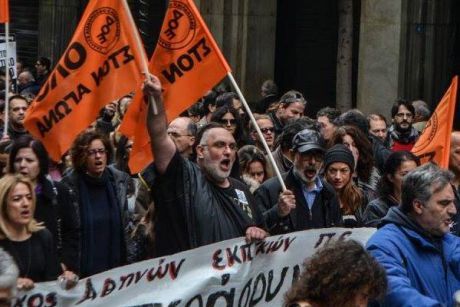Shared
You are here
Biggest general strike in years defies Syriza's pension cuts in Greece

February 10, 2016
The huge general strike rally in Athens last Thursday, was probably the biggest since 2011 and the summer of mass occupations of public squares.
The centre of Athens was so full of people that any attempt at separate rallies became meaningless. The picture is the same all over Greece—the rally in the second city Thessalonica was huge and there were rallies even in many small places.
Public and private sector unions called their third general strike against pension cuts. In the morning it was like a Sunday. Everything was shut down, nothing worked. The one exception was the media—its workers struck the previous day and reported on the demonstration today.
Other sectors outside the working class joined in. Striking lawyers had a huge contingent. Small shopkeepers shut for the day and marched. Even farmers who have been blocking roads joined the demonstrations of workers.
On the eve of the strike even the Syriza government made a statement supporting the strike. It said it could strengthen its position in negotiating with Greece’s “Troika” of creditors—the European Union, European Central Bank and International Monetary Fund.
It had little choice. Previously Syriza had tried to undermine the strike movement.
Government supporters tried to paint the lawyers’ protests as a movement of the rich. And they claimed the farmers’ rallies had been led by the fascist Golden Dawn.
Last thursday gave that the lie. In reality many farmers voted Syriza. Golden Dawn has tried to infiltrate their protests, but on the march today its supporters were confronted and had to leave.
Strength
Every attempt to dampen down the movement has failed. The mood on the demonstration was of a show of strength. The main demand was to stop the bill before it reaches parliament.
Trade union bureaucrats have tried to delay, holding fire until a big demonstration the day the pensions bill is voted through parliament. But they thought that would have happened by now. Instead the government has kept delaying. It means they will have to call another general strike.
Sections of the movement are escalating—such as the ferry workers and possibly soon the electricity workers. The workers with the most to lose from the bill are those with the best pensions. These are the fruit of decades of struggle, so those workers are often the best organised.
And no-one dares divert the anger onto refugees in Greece. Everyone supports them. As well as the anti-racist organisation Keerfa there were groups of people marching independently with homemade pro-refugee banners. The farmers are the most conservative section. But when refugees walking to Greece’s northern border encountered a farmers’ blockade this week, farmers responded by inviting them to warm themselves around their fire.
All this puts the government in a tight spot with no easy way out. It can’t offer concessions without confronting the Troika—pension reform is central to their demands. But it can’t push the reform through without confronting the movement.
And this is a very different movement to five or six years ago. Then people were getting their first taste of a general strike. Now they have experienced years of struggle—and shifted to the left.
Panos Garganas is editor of Socialist Worker's Greek sister paper Workers Solidarity. This is shared from Socialist Worker (UK)
Section:









